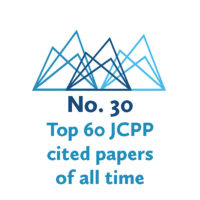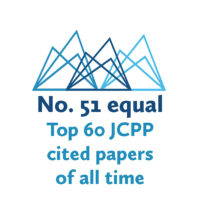Empathy
-

Personality Function, Dysfunction, and the Social Domains Organisation of Mentalizing Processes
In this three-part Papers Podcast, Professor Jonathan Hill discusses his JCPP paper ‘The social domains organization of mentalizing processes in adolescents: a contribution to the conceptualization of personality function and dysfunction in young people’.
This three-part podcast explores the controversy surrounding personality function and dysfunction, focuses on mentalizing, the mentalizing processes, and social domains, and provides an overview of the paper, methodology, key findings, and implications for practice.
Read more -

Research Review: The typical and atypical development of empathy: How big is the gap from lab to field?
Open Access paper from JCPP Advances – “Empathy-understanding and sharing someone else’s feelings-is crucial for social bonds. Studies on empathy development are limited and mainly performed with behavioural assessments. This is in contrast to the extensive literature on cognitive and affective empathy in adults. However, understanding the mechanisms behind empathy development is critical to developing early interventions to support children with limited empathy.” Chiara Bulgarelli and Emily J. H. Jones
Read more -

Is infant empathy linked with later externalizing problems?
Until recently, it has been assumed that young infants cannot feel empathy for others.1 However, emerging data suggest that this might not actually be the case.2 Now, Yael Paz and colleagues have examined empathy development during the first years of life, analysing data from 165 infants involved in a longitudinal, prospective study.
Read more -

Female Pioneers: Tamsin Ford CBE on psychologist and analyst Alice Miller
To celebrate International Women’s Day, three ACAMH luminaries shine the spotlight on the female pioneers of child and adolescent psychology, psychiatry and psychoanalysis, they most admire. “Miller stands out because she demonstrated critical thought and was prepared to openly change her stance in the light of her research findings.”
Read more -

Most Cited JCPP Articles #30 of 60
Most cited JCPP papers #30 of 60: Parent-infant synchrony and the construction of shared timing; physiological precursors, developmental outcomes, and risk conditions
Read more -

Most Cited JCPP Articles #51 of 60
Most cited JCPP papers #51 of 60: Developmental language disorders a follow-up in later adult life. Cognitive, language and psychosocial outcomes
Read more -

Children at risk of developing antisocial behaviours show deficits in affective empathy
Researchers in the Netherlands and UK have monitored cardiovascular and electrodermal activity and eye tracking to assess affective and cognitive empathy in children at high risk of engaging in criminal behaviours.
Read more -

Low empathy in adolescent boys predicts violent behaviour in adulthood
Low empathy and low resting heart rate are established, independent risk factors of antisocial behaviour. Now, researchers from the University of Pittsburgh have studied whether an interaction between these two factors during adolescence might mediate violent behaviour in early adulthood.
Read more -

Compensating for ASD: masking the truth?
“Compensation” is a phenomenon by which individuals with Autism Spectrum Disorder (ASD) show improvements in overt symptoms, namely their understanding of others (“theory-of-mind”, ToM), despite persisting deficits at the cognitive and neurobiological levels.
Read more -

Mental health workers have more empathy
Mental health workers have greater empathy than physicians or other professionals, according to a study from Favaloro University, Buenos Aires.
Read more